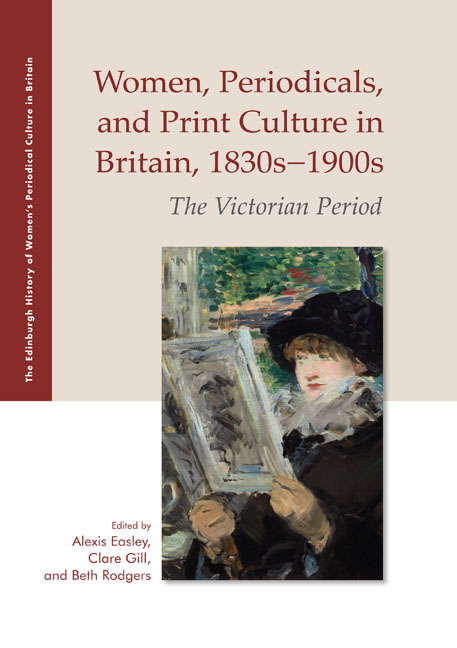Book contents
- Frontmatter
- Contents
- List of Illustrations
- Acknowledgments
- Introduction: Women, Periodicals, and Print Culture in the Victorian Period
- Part I (Re)Imagining Domestic Life
- Part II Constructing Modern Girls and Young Women
- Part III Women and Visual Culture
- Part IV Making Space for Women
- Part V Constructing Women Readers and Writers
- Constructing Women Readers and Writers: Introduction
- 24 ‘Afford[ing] me a Place’: Recovering Women Poets in Blackwood's Edinburgh Magazine, 1827–1835
- 25 Constructing the Mass-Market Woman Reader and Writer: Eliza Cook and the Weekly Dispatch, 1836–1850
- 26 Elizabeth Gaskell and the Habit of Serialisation
- 27 Gender and Genre in Reviews of the Theological Novel
- 28 Reading Poet Amy Levy through Victorian Newspapers
- 29 ‘I simply write it to order’: L. T. Meade, Sisters of Sherlock, and the Strand Magazine
- Part VI Intervening in Political Debates
- Notes on Contributors
- Index
- Plate section
27 - Gender and Genre in Reviews of the Theological Novel
from Part V - Constructing Women Readers and Writers
Published online by Cambridge University Press: 25 October 2019
- Frontmatter
- Contents
- List of Illustrations
- Acknowledgments
- Introduction: Women, Periodicals, and Print Culture in the Victorian Period
- Part I (Re)Imagining Domestic Life
- Part II Constructing Modern Girls and Young Women
- Part III Women and Visual Culture
- Part IV Making Space for Women
- Part V Constructing Women Readers and Writers
- Constructing Women Readers and Writers: Introduction
- 24 ‘Afford[ing] me a Place’: Recovering Women Poets in Blackwood's Edinburgh Magazine, 1827–1835
- 25 Constructing the Mass-Market Woman Reader and Writer: Eliza Cook and the Weekly Dispatch, 1836–1850
- 26 Elizabeth Gaskell and the Habit of Serialisation
- 27 Gender and Genre in Reviews of the Theological Novel
- 28 Reading Poet Amy Levy through Victorian Newspapers
- 29 ‘I simply write it to order’: L. T. Meade, Sisters of Sherlock, and the Strand Magazine
- Part VI Intervening in Political Debates
- Notes on Contributors
- Index
- Plate section
Summary
IN THE FALL OF 1888, the Boston publisher Roberts Brothers ran an advertisement in publications including the New York Times, the Chicago Daily Tribune, the New-York Tribune, and the Andover Review proclaiming a ‘Heretical Literary Trinity.’ The advertisement quoted an editorial in the Boston Saturday Evening Gazette which had thus designated three novels: Robert Elsmere (1888), by Mrs Humphry Ward (Mary Ward); John Ward, Preacher (1888), by Margaret Deland; and The Story of an African Farm (1883), by Olive Schreiner (Ralph Iron). The editorial excerpted in the advertisement explains that the novels present
the problems of our age; one is to make men morally strong and keep the church at the same time intellectually honest; the other is to keep the church strongly and obediently organized, and yet elastic enough to make use of many minds.
The three novels we have mentioned here have at least done something toward making clear the field of battle, and showing with some accuracy the forces that will meet upon that field; and the thanks of all men who are studying and working with these problems in mind are due to these three women, who have given them light, even though they have not given all that is needed. (Boston Saturday Evening Gazette 6 Oct 1888: n.p.)
As an advertisement, this passage is a somewhat surprising choice; the praise offered by the Gazette is hardly overwhelming. The complexities of contemporary religious problems, which require the negotiation of conflicting demands, are, it turns out, only represented with ‘some accuracy’ in three novels that do only ‘something’ toward clarifying the issues. These limitations, the final phrase implies, are due to both gender and genre. Study and work are rendered as male and elevated above the feminine novel; men's debt to women is both established and curtailed: they owe some thanks, but not too many, as the authors ‘have not given all [the light] that is needed.’ The rest of the editorial further distinguishes between men's and women's relationship to theology, suggesting that women do not originate theological ideas, although they may engage with them.
- Type
- Chapter
- Information
- Women, Periodicals and Print Culture in Britain, 1830s–1900sThe Victorian Period, pp. 442 - 455Publisher: Edinburgh University PressPrint publication year: 2019

